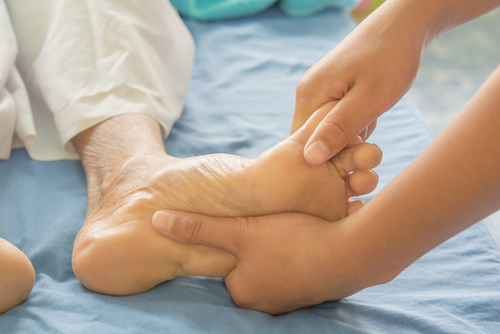Glen Allen Office
(804) 747-3380
 There are many people who are aware of and enjoy the benefits of foot massages. Research has indicated they may help to promote a more restful sleep, in addition to improved blood circulation, and general aches and pains may be relieved. Pregnant women find it can help to reduce swelling in the feet and ankles, and menopause symptoms, such as hot flashes, may be decreased. Patients enjoy the relaxing sensation when warm oil is used during the massage, while pressing underneath each toe. If you would like to know more about the benefits of getting regular foot massages, please confer with a podiatrist who can advise you on what type of foot therapy is right for you.
There are many people who are aware of and enjoy the benefits of foot massages. Research has indicated they may help to promote a more restful sleep, in addition to improved blood circulation, and general aches and pains may be relieved. Pregnant women find it can help to reduce swelling in the feet and ankles, and menopause symptoms, such as hot flashes, may be decreased. Patients enjoy the relaxing sensation when warm oil is used during the massage, while pressing underneath each toe. If you would like to know more about the benefits of getting regular foot massages, please confer with a podiatrist who can advise you on what type of foot therapy is right for you.
Foot therapy is often necessary for those recovering from either foot deformities or foot injuries. If you have concerns regarding therapy, consult with one of our podiatrists from The Podiatry Center. Our doctors can provide the care you need to keep you pain-free and on your feet.
Most Common Injuries
People who are active or athletes are prone to a variety of injuries. Therefore, it is often important to take part in physical therapy in order to quickly get back on the right track.
What to Do When Injured
Physical Therapy – This specialized treatment will focus on the affected area, speeding up recovery and the overall healing process. It is a proven method that has helped millions of people return from any injury.
During physical therapy you will undergo regimented training to get back into full form. Training is often very difficult, especially at first when the foot feels weak. Physical therapy often involves:
Basic stretching and twisting exercises – getting the feet’s mobility and flexibility up.
Massaging – the therapist will massage the injured area in order to activate the muscles and relax them.
Strengthening Exercises – this allows the muscles in the affected area to regain their full strength, a vital step towards full recovery.
If you have any questions please feel free to contact one of our offices located in Richmond and Glen Allen, VA . We offer the newest diagnostic tools and technology to treat your foot and ankle needs.
 Burning pain in the joints of the big toe is a common symptom that is often associated with gout. This condition can be caused by excess uric acid in the blood levels and crystals can form in the joints. This can lead to severe pain and discomfort, and walking may be difficult. Some of the reasons gout may develop can come from genetic factors, obesity, and eating foods that have high levels of purines. These can include shellfish, red meat, and drinks that are made with large amounts of sugar. Patients who are afflicted with gout may find relief when healthy eating habits are implemented, and it can be beneficial to follow a simple exercise program. People who have gout are strongly advised to be under the care of a podiatrist who can effectively treat this condition.
Burning pain in the joints of the big toe is a common symptom that is often associated with gout. This condition can be caused by excess uric acid in the blood levels and crystals can form in the joints. This can lead to severe pain and discomfort, and walking may be difficult. Some of the reasons gout may develop can come from genetic factors, obesity, and eating foods that have high levels of purines. These can include shellfish, red meat, and drinks that are made with large amounts of sugar. Patients who are afflicted with gout may find relief when healthy eating habits are implemented, and it can be beneficial to follow a simple exercise program. People who have gout are strongly advised to be under the care of a podiatrist who can effectively treat this condition.
Gout is a painful condition that can be treated. If you are seeking treatment, contact one of our podiatrists from The Podiatry Center. Our doctors will treat your foot and ankle needs.
What Is Gout?
Gout is a form of arthritis that is characterized by sudden, severe attacks of pain, redness, and tenderness in the joints. The condition usually affects the joint at the base of the big toe. A gout attack can occur at any random time, such as the middle of the night while you are asleep.
Symptoms
Risk Factors
Prior to visiting your podiatrist to receive treatment for gout, there are a few things you should do beforehand. If you have gout you should write down your symptoms--including when they started and how often you experience them, important medical information you may have, and any questions you may have. Writing down these three things will help your podiatrist in assessing your specific situation so that he or she may provide the best route of treatment for you.
If you have any questions, please feel free to contact one of our offices located in Richmond and Glen Allen, VA . We offer the newest diagnostic and treatment technologies for all your foot care needs.
 The tarsal navicular bone is one of the many small bones in the foot that sits on the inside of the foot and helps support the arch of the foot. Due to the bone’s location, activities such as running or jumping can create risk for an injury to the bone, such as a stress fracture known as a navicular stress fracture. Usually stress fractures are a result of repetitive forces to the foot, and they become an overuse injury. Common risks for sustaining this particular stress fracture include an increase in sports training, low bone density, change of running shoes or training surface, poor nutrition, or an abnormal foot structure. If you believe that you are suffering a navicular stress fracture, it is suggested that you consult with a podiatrist for a proper diagnosis and treatment.
The tarsal navicular bone is one of the many small bones in the foot that sits on the inside of the foot and helps support the arch of the foot. Due to the bone’s location, activities such as running or jumping can create risk for an injury to the bone, such as a stress fracture known as a navicular stress fracture. Usually stress fractures are a result of repetitive forces to the foot, and they become an overuse injury. Common risks for sustaining this particular stress fracture include an increase in sports training, low bone density, change of running shoes or training surface, poor nutrition, or an abnormal foot structure. If you believe that you are suffering a navicular stress fracture, it is suggested that you consult with a podiatrist for a proper diagnosis and treatment.
Stress fractures occur when there is a tiny crack within a bone. To learn more, contact one of our podiatrists from The Podiatry Center. Our doctors can provide the care you need to keep you pain free and on your feet.
How Are They Caused?
Stress fractures are the result of repetitive force being placed on the bone. Since the lower leg and feet often carry most of the body’s weight, stress fractures are likely to occur in these areas. If you rush into a new exercise, you are more likely to develop a stress fracture since you are starting too much, too soon. Pain resulting from stress fractures may go unnoticed at first, however it may start to worsen over time.
Risk Factors
Stress fractures do not always heal properly, so it is important that you seek help from a podiatrist if you suspect you may have one. Ignoring your stress fracture may cause it to worsen, and you may develop chronic pain as well as additional fractures.
If you have any questions, please feel free to contact one of our offices located in Richmond and Glen Allen, VA . We offer the newest diagnostic and treatment technologies for all your foot care needs.
 The Achilles tendon is known to be the largest tendon in the body. It is located in the back of the leg and connects the calf to the heel. An injury to this tendon can cause severe pain and discomfort, and can happen for a variety of reasons. These can include wearing shoes that do not fit correctly, improperly warming up before running, or increasing a workout intensity too quickly. The common symptoms of an Achilles tendon injury can consist of swelling in the heel and surrounding areas, and it may be difficult to walk and stand. After a proper diagnosis is made, which generally consists of having an X-ray, ultrasound, or MRI performed, the correct treatment can begin. If you have endured an Achilles tendon injury, it is strongly suggested that you consult with a podiatrist who will determine what the best treatment is for you.
The Achilles tendon is known to be the largest tendon in the body. It is located in the back of the leg and connects the calf to the heel. An injury to this tendon can cause severe pain and discomfort, and can happen for a variety of reasons. These can include wearing shoes that do not fit correctly, improperly warming up before running, or increasing a workout intensity too quickly. The common symptoms of an Achilles tendon injury can consist of swelling in the heel and surrounding areas, and it may be difficult to walk and stand. After a proper diagnosis is made, which generally consists of having an X-ray, ultrasound, or MRI performed, the correct treatment can begin. If you have endured an Achilles tendon injury, it is strongly suggested that you consult with a podiatrist who will determine what the best treatment is for you.
Achilles tendon injuries need immediate attention to avoid future complications. If you have any concerns, contact one of our podiatrists of The Podiatry Center. Our doctors can provide the care you need to keep you pain-free and on your feet.
What Is the Achilles Tendon?
The Achilles tendon is a tendon that connects the lower leg muscles and calf to the heel of the foot. It is the strongest tendon in the human body and is essential for making movement possible. Because this tendon is such an integral part of the body, any injuries to it can create immense difficulties and should immediately be presented to a doctor.
What Are the Symptoms of an Achilles Tendon Injury?
There are various types of injuries that can affect the Achilles tendon. The two most common injuries are Achilles tendinitis and ruptures of the tendon.
Achilles Tendinitis Symptoms
Rupture Symptoms
Treatment and Prevention
Achilles tendon injuries are diagnosed by a thorough physical evaluation, which can include an MRI. Treatment involves rest, physical therapy, and in some cases, surgery. However, various preventative measures can be taken to avoid these injuries, such as:
If you have any questions please feel free to contact one of our offices located in Richmond and Glen Allen, VA . We offer the newest diagnostic tools and technology to treat your foot and ankle needs.